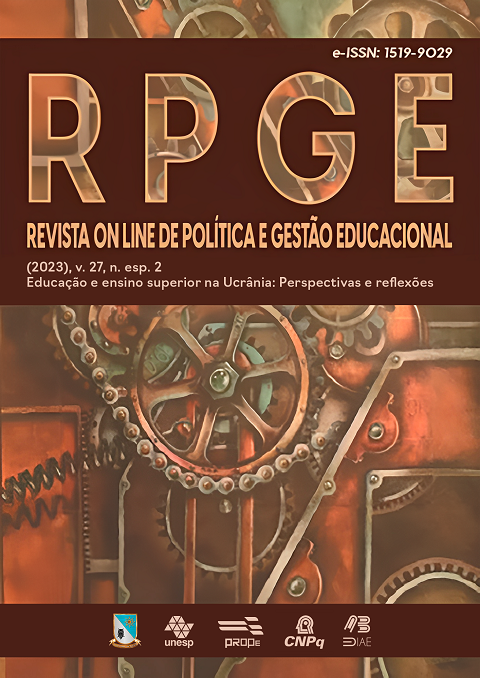Modern higher biological education in the context of war
Theoretical and practical discourse (Ukrainian experience)
DOI:
https://doi.org/10.22633/rpge.v27iesp.2.18389Keywords:
Higher biological education, Russian-Ukrainian war, Transformations, Practical experienceAbstract
The purpose of the article is to analyze the theoretical and practical discourse of higher biological education in the conditions of hostilities and open Russian military aggression. Methods of analysis and synthesis, abstraction, comparison were used to implement the task. In the results of the study, the Ukrainian experience of organizing higher biological education during the martial law, the formation of opportunities for further development using the obtained best experience and potential European integration is updated. The main risks on the path of further development of higher biological education and prospects for further improvement of the general situation are highlighted. In particular, military challenges made it possible to develop higher biological education. In the conclusions, it is shown, that the regeneration of the field of education is possible against the background of the restoration of the administrative system in general.
Downloads
References
AMBARWATI, R.; FAIZAH, U.; RAHAYU, D. A. Enhancing the digital literacy of pre-service biology teacher through animal systematics course. In: PROCEEDINGS OF THE MATHEMATICS, INFORMATICS, SCIENCE, AND EDUCATION INTERNATIONAL CONFERENCE, 2019, Surabaya, Indonesia. Proceedings [...]. Paris, France: Atlantis Press, 2019. ISBN 9789462528741. DOI: 10.2991/miseic-19.2019.46.
BAKHMAT, N. et al. Modernization of future teachers' professional training: on the role of immersive technologies. Futurity Education, v. 2, n. 1, p. 28-37, 2022. DOI: 10.57125/fed/2022.10.11.22.
CHANKSELIANI, M.; QORABOYEV, I.; GIMRANOVA, D. Higher education contributing to local, national, and global development: new empirical and conceptual insights. Higher Education, v. 81, n. 1, p. 109-127, 2020. DOI: 10.1007/s10734-020-00565-8.
CHANKSELIANI, M.; QORABOYEV, I.; GIMRANOVA, D. Higher education contributing to local, national, and global development: new empirical and conceptual insights. Higher Education, v. 81, n. 1, p. 109-127, 2020. DOI: 10.1007/s10734-020-00565-8.
CHRÁSKOVÁ, M.; CHRÁSKA, M. Availability of implementation of standards of digital competence of secondary education teachers. Futurity Education, v. 1, n. 1, p. 32–40, 2021. DOI: 10.57125/FED.2022.10.11.4.
DHAWAN, S. Online learning: A panacea in the time of COVID-19 crisis. Journal of Educational Technology Systems, v. 49, n. 1, p. 5-22, 2020. DOI: 10.1177/0047239520934018.
HUANG, R.; SPECTOR, M.; YANG, J. Educational technology: a primer for the 21st century. [S. l.]: Springer, 2019. 248 p. ISBN 9789811366420.
JANDRIĆ, P. Biology, information, society. Postdigital Science and Education, v. 3, n. 2, p. 261-265, 2021. DOI: 10.1007/s42438-021-00220-0.
JANDRIĆ, P. Biology, information, society. Postdigital Science and Education, v. 3, n. 2, p. 261-265, 2021. DOI: 10.1007/s42438-021-00220-0.
JENA, B.; GUPTA,S.; MISHRA, N. Effectiveness of online learning and face-to-face teaching pedagogy. In: JENA, B. M.; GUPTA, S. L.; MISHRA, N. Transforming higher education through digitalization. Boca Raton: CRC Press, 2021. p. 21-43. DOI: 10.1201/9781003132097-2.
KUBITSKYI, S. et al. Management of pedagogical and sports educational institutions in Ukraine. SPORT TK-Revista EuroAmericana de Ciencias del Deporte, v. 11, p. 19, 2022. DOI: 10.6018/sportk.538991.
LOBACH, N.; SAENKO, M.; ISYCHKO, L. Disadvantages and advantages of implementing distance learning in higher institutions of medical education. Viae Educationis. Studies of Education and Didactics, v. 1, n. 3, p. 13-18, 2022. DOI: 10.15804/ve.2022.03.01.
METCALF, L.; BERNACKI, M.; BERNACKI, L. How do digital textbook platforms promote active learning in undergraduate biology courses? Journal of Research in Science Teaching, DOI: 10.1002/tea.21845.
NAPAL FRAILE, M. et al. Digital narratives for biology learning. In: NAPAL FRAILE, M. et al. Contributions from biology education research. Cham: Springer International Publishing, 2022. p. 87-98. DOI: 10.1007/978-3-030-89480-1_7.
NEHM, R. Biology education research: building integrative frameworks for teaching and learning about living systems. Disciplinary and Interdisciplinary Science Education Research, v. 1, n. 1, 2019. DOI: 10.1186/s43031-019-0017-6.
NOURZAIE, H.; MOHAMMED, T.; BATT, M. Digital learning: the future of medical education? The Clinical Teacher, v. 15, n. 4, p. 353, 2018. DOI: 10.1111/tct.12810.
OLIVEIRA, A. et al. Emerging technologies as pedagogical tools for teaching and learning science: a literature review. Human Behavior and Emerging Technologies, v. 1, n. 2, p. 149-160, 2019. DOI: 10.1002/hbe2.141.
RAJAB, K. The effectiveness and potential of e-learning in war zones: an empirical comparison of face-to-face and online education in Saudi Arabia. IEEE Access, v. 6, p. 6783-6794, 2018. DOI: 10.1109/access.2018.2800164.
RAKHIMOV, T.; MUKHAMEDIEV, M. Peculiarities of the implementation of the principles of the education of the future analysis of the main dilemmas. Futurity Education, v. 2, n. 3, p. 4–13, 2022. DOI: 10.57125/FED/2022.10.11.29.
WILLIAMSON, B. New digital laboratories of experimental knowledge production: artificial intelligence and education research. London Review of Education, v. 18, n. 2, 2020. DOI: 10.14324/lre.18.2.05.
WOJCIECH, W. et al. Future educator's digital learning assets: global challenges of our time. Futurity Education, v. 1, n. 2, p. 32-41, 2021. DOI: 10.57125/fed/2022.10.11.17.
ŽUPANEC, V.; LAZAREVIĆ, T.; PRIBIĆEVIĆ, T. Classes supported by digital technologies: the application of the blog as a virtual tool in biology teaching. Inovacije u nastavi, v. 35, n. 3, p. 120-133, 2022. DOI: 10.5937/inovacije2203120z.
Published
How to Cite
Issue
Section
License
Copyright (c) 2023 Revista on line de Política e Gestão Educacional

This work is licensed under a Creative Commons Attribution-NonCommercial-ShareAlike 4.0 International License.
Manuscritos aceitos e publicados são de propriedade da Revista on line de Política e Gestão Educacional. É vedada a submissão integral ou parcial do manuscrito a qualquer outro periódico. A responsabilidade do conteúdo dos artigos é exclusiva dos autores. É vedada a tradução para outro idioma sem a autorização escrita do Editor ouvida a Comissão Editorial Científica.











